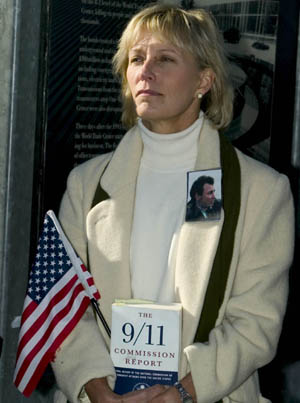Beverly Eckert
(activist, 9-11/Premature death) | |
|---|---|
 | |
| Born | 1951-05-29 Buffalo, New York, U.S. |
| Died | 2009-02-12 (Age 57) Clarence Center, New York, U.S. |
| Nationality | American |
| Alma mater | State University of New York at Buffalo |
| Spouse | Sean Rooney |
| Victim of | Premature death |
September 11, 2001
Beverly Eckert's husband was killed by the 9/11 attacks. Rather than $1.8 million for the death of her husband from the 9-11/Compensation fund, she instead pursued justice in the US legal system. In a moving editorial she wrote “I say to Congress, big business, and everyone who conspired to divert attention from government and private sector failures: My husband’s life was priceless, and I will not let his death be meaningless. My silence cannot be bought.”[1]
Activism
Beverly Eckert founded Voices of September 11th, a victims advocacy group.[2]
Death
Beverly Eckert was killed in a plane crash which Gorton suggests that "most likely this crash was one in a long line of plane crashes used to kill high profile threats to the criminal syndicate at the heart of the national security state."[1]
A Quote by Beverly Eckert
| Page | Quote | Date | Source |
|---|---|---|---|
| 9-11/Compensation fund | “The victims fund was not created in a spirit of compassion. Rather, it was a tacit acknowledgement by Congress that it tampered with our civil justice system in an unprecedented way. Lawmakers capped the liability of the airlines at the behest of lobbyists who descended on Washington while the Sept. 11 fires still smouldered.
And this liability cap protects not just the airlines, but also World Trade Center builders, safety engineers and other defendants. The caps on liability have consequences for those who want to sue to shed light on the mistakes of 9/11. It means the playing field is tilted steeply in favor of those who need to be held accountable. With the financial consequences other than insurance proceeds removed, there is no incentive for those whose negligence contributed to the death toll to acknowledge their failings or implement reforms. They can afford to deny culpability and play a waiting game.” | 19 December 2003 | USA Today |